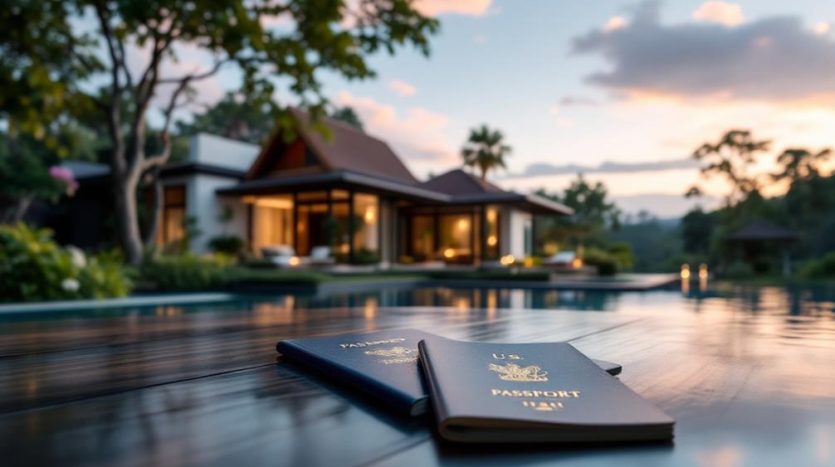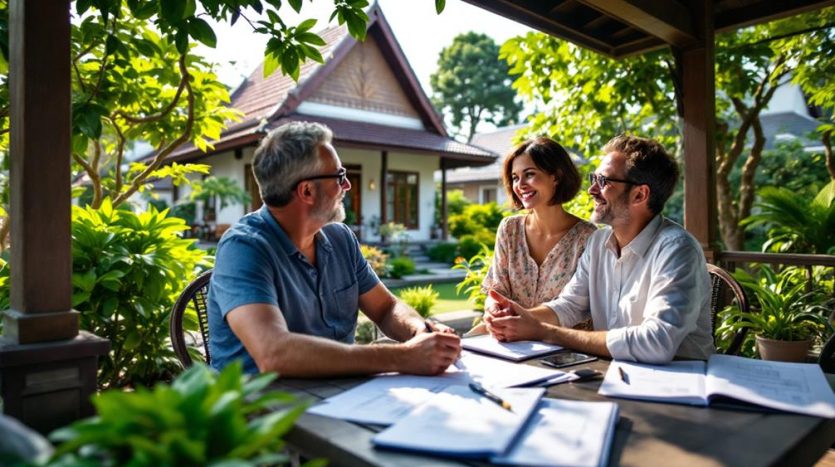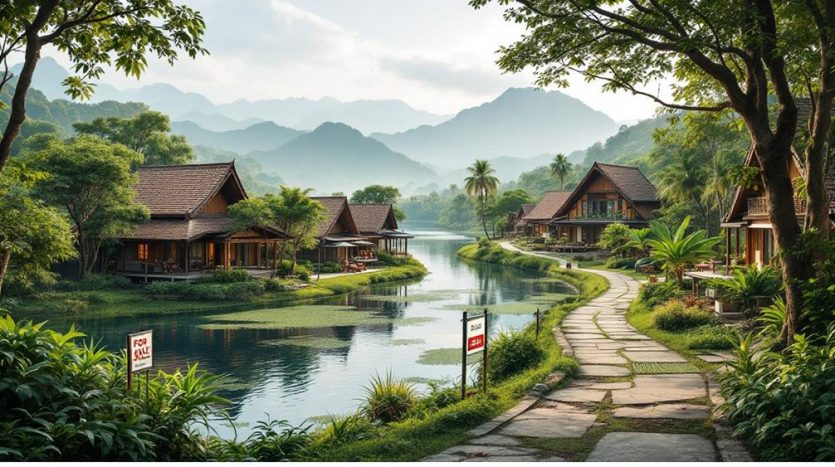Can You Buy a House in Thailand if You Are a US Citizen?
Did you know that foreign buyers own around 39% of the condominium market in Bangkok? If you're a US citizen considering buying a house in Thailand, you're not alone, but the process is a bit more complex than you might think. While you can own a building, the land itself remains off-limits. So, how can you navigate these restrictions and still make your dream of owning property in Thailand a reality? Understanding leasehold agreements, working with Thai nationals, and other legal strategies might just be the way forward.
Key Takeaways
- US citizens can own buildings in Thailand but not the land they are built on.
- Foreign ownership of condominiums is restricted to 49% of the total floor area.
- Leasehold agreements allow US citizens to lease land for up to 30 years.
- Establishing a Thai company can provide a workaround for foreign land ownership restrictions.
- Property purchases through a Thai spouse require the land to be in the spouse's name.
Understanding Thai Property Laws

Maneuvering through Thailand's property laws is essential for any US citizen considering a real estate purchase in the country. Think of it as traversing a jungle, but instead of wild animals, you're dealing with legal intricacies.
As you commence your property investment journey, it's vital to understand the landscape of market trends in Thailand. You'll want to keep your eyes peeled for the latest shifts, such as booming tourist hotspots or emerging business districts. Remember, buying property isn't just about purchasing a home; it's about making a savvy investment.
Now, let's cut through the legal red tape. Thailand's property laws can seem as mysterious as a bowl of Tom Yum Goong, but don't worry, you won't need a linguistics degree to decode them.
You simply need to be aware of the rules, such as the foreign ownership restrictions that limit land ownership and the options for investing through leasehold agreements or Thai Limited Companies.
Keep a close watch on local market trends to guarantee you're making a wise choice. By arming yourself with the right knowledge, you'll traverse the Thai property market like a pro, avoiding pitfalls and perhaps even finding a slice of paradise.
Foreign Ownership Restrictions
When contemplating buying property in Thailand, understanding foreign ownership restrictions is essential. Thailand, with its stunning beaches and bustling markets, seems like the ultimate paradise. One might be tempted by the affordable options in rural areas, where properties cost between 1-3 million baht, offering larger plots at lower prices.
But, before you start dreaming of sipping coconut water on your own porch, you should know about the country's property regulations. Foreigners can own buildings, but not the land they're built on—unless you're planning to float your dream house on a raft, this means you'll have to navigate some tricky waters.
Thailand's property regulations limit foreign investment by restricting land ownership. Foreigners can own up to 49% of a condominium's total floor area. So, if you're eyeing a condo with a view, make sure you're part of the lucky half.
For those wanting a house with a garden, you might need to explore other options, like partnering with a Thai citizen or a registered Thai company to own land. Remember, setting up a company just for the land purchase requires jumping through legal hoops and isn't as simple as naming it "My Thai House, Inc."
Leasehold Agreements
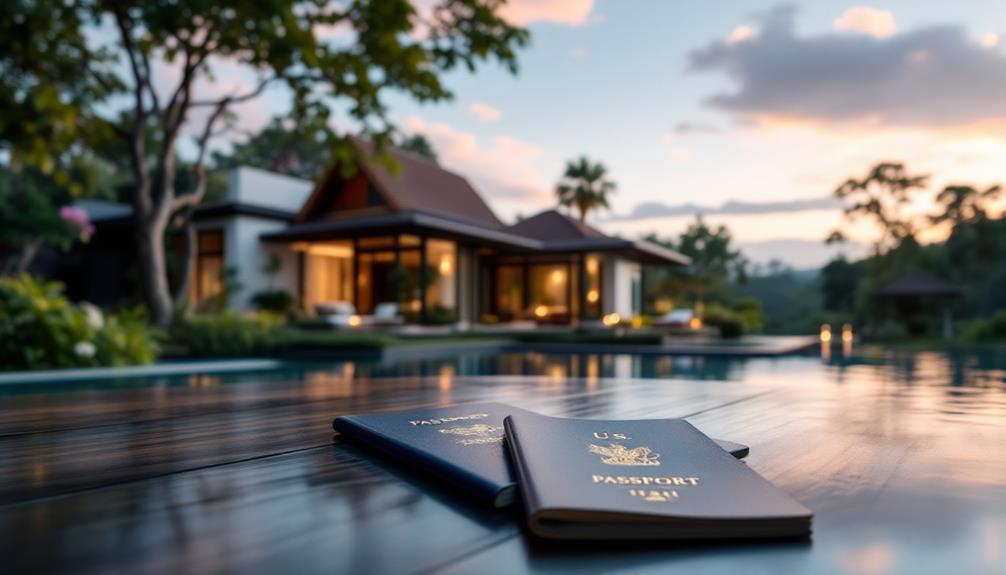
When considering property in Thailand, you'll find that leasehold agreements are a practical option due to foreign ownership restrictions.
The legal framework allows you to lease land for up to 30 years, with potential extensions negotiated between you and the landowner.
For Americans interested in renting, short-term rentals offer flexibility, often coming fully furnished, while long-term leases provide stability and can involve negotiation for cost savings.
Understanding these terms is essential as they directly impact your long-term investment strategy.
Legal Framework Overview
Understanding the legal framework of leasehold agreements is essential for US citizens looking to buy property in Thailand. While you may not own the land outright, you can lease it for up to 30 years. Think of it as a really long vacation rental with commitment issues.
Before signing anything, seeking legal advice is a must. Lawyers in Thailand know the ins and outs of property laws and can help you avoid any pitfalls—like accidentally signing away your firstborn or paying property taxes you didn't know existed.
Speaking of property taxes, they're a vital part of the deal. While not as hefty as in the US, you'll still need to shell out some Baht to keep things above board.
The tax system here can seem like a maze designed by a sadistic game show host, so having a savvy local expert is invaluable. They'll help you navigate this labyrinth with fewer headaches and maybe some laughs.
In short, leasehold agreements let you enjoy your slice of Thai paradise without owning the dirt. Just watch out for unexpected legal twists and get that professional advice before diving in.
Lease Terms Duration
Leasehold agreements in Thailand offer a maximum duration of 30 years, a standard that allows you to enjoy your property without permanent ownership. Think of it as a long-term relationship where you both know it's not forever—like a marriage with an expiration date.
You're fundamentally renting a home from the future, with the promise of a solid three-decade commitment. The lease duration gives you ample time to sip coconut water and perfect your Thai language skills.
Now, when you're nearing the end of your 30-year lease, you might be wondering if you can renew your vows, so to speak. Lease renewal is possible but isn't guaranteed.
You'll need to negotiate with the landowner, who'll be holding the cards—or the land, in this case. Sometimes, a contract may include an option to renew, potentially extending your tropical adventure by another 30 years, but this isn't something you should assume.
In this land of smiles (and spicy food), understanding lease terms is vital.
Condominium Ownership
When considering condominium ownership in Thailand, you'll find that foreign ownership is limited to 49% of the building's total area. This restriction makes it essential to understand the distinction between leasehold and freehold options, as each has different implications for long-term investment and ownership rights.
Additionally, it should be highlighted that urban areas generally have higher property prices than rural settings, which can affect your decision-making process based on budget constraints.
Steering through these choices requires analyzing how each option aligns with your financial goals and lifestyle preferences.
Foreign Ownership Limits
In maneuvering the complexities of property ownership in Thailand, it's crucial to understand the legal constraints on foreign ownership, particularly when it comes to condominiums.
As a US citizen, you're probably aware that buying a beachfront condo sounds like a dream. However, the Thai government throws a few curveballs your way. They allow foreigners to own a maximum of 49% of the total floor area of a condominium building. Beyond this threshold, your ownership dreams might need a different game plan.
Before diving headfirst into this venture, consider:
- Property Taxes: Although they're relatively low in Thailand, they can sneak up on you faster than a gecko in a Bangkok alley.
- Investment Risks: Political instability or currency fluctuations could affect the value of your shiny new condo.
- Legal Paperwork: Verify all documents are scrutinized so you don't end up owning a broom closet instead of a penthouse.
- Due Diligence: Double-check the condo's foreign ownership quota to avoid buying into a non-compliant building.
Leasehold vs. Freehold
While traversing the foreign ownership limits, you'll encounter two primary forms of condominium ownership in Thailand: leasehold and freehold.
With leasehold, you're basically renting your paradise in the Land of Smiles for up to 30 years. Think of it as a long-term commitment without the lifelong baggage. One of the leasehold benefits is that you dodge the whole foreign ownership quota drama. You get a slice of heaven without worrying about those pesky laws that say foreigners can't own more than 49% of a building. Plus, at the end of the lease, you might even negotiate a renewal.
On the flip side, freehold offers the eternal joy of actually owning your condo, but beware the freehold drawbacks. First, you're fighting tooth and nail for that 49% quota. It's like playing musical chairs, but with way more paperwork and legal fees.
Additionally, freehold properties often come with a heftier price tag because, well, forever isn't cheap. So, if you're feeling adventurous (and flush with cash), freehold might be for you. But if you prefer fewer legal hoops and a lighter wallet, leasehold could be your stress-free ticket to Thai home ownership.
Using a Thai Company

Exploring the option of using a Thai company to purchase property in Thailand offers a strategic path for US citizens seeking to navigate the country's real estate regulations.
With a little effort and a penchant for paperwork, you can set up a Thai company, enabling corporate ownership of land—a nifty workaround considering foreigners can't directly own land in Thailand.
But before you start dreaming of beachfront bungalows, let's break down the essentials.
Here's what you need to know about Thai company formation:
- Local Shareholding: At least 51% of the company must be owned by Thai nationals, so you'll need a few local allies.
- Board of Directors: The company should have a board, and you can be a director. Just think of it as your own tropical boardroom.
- Capital Requirements: There's a minimum capital requirement to form a company. Think of it as a cover charge for your entry into the Thai market.
- Legal Compliance: Regular legal and tax filings are essential, so keep your accountant on speed dial.
This approach isn't without its quirks and challenges, but it's a viable route for those keen to embrace a little corporate adventure.
Investment Through Board of Investment
Another strategic option for US citizens eyeing Thai real estate is investment through the Board of Investment (BOI).
Think of BOI as your backstage pass to Thailand's property market, complete with tax incentives that could make your accountant do a little happy dance. By aligning your investment with BOI-approved sectors, you gain access to a treasure trove of investment opportunities that go beyond the typical purchase.
It's like getting a VIP ticket to an exclusive club, without the velvet ropes and bouncers.
Now, what makes BOI-approved investments so appealing? First, the tax incentives are nothing short of a gift. Imagine paying less tax and enjoying benefits like land ownership rights if your investment aligns with certain business activities.
These opportunities are tailored for those who are serious about making their money work in Thailand, not just settling for a beach hut with a leaky roof.
But, fair warning, maneuvering the BOI process can be as complex as a soap opera plot twist. You'll need patience, possibly a translator, and definitely a sense of humor.
Land Ownership via Thai Spouse

If you're married to a Thai national, you might explore land ownership through your spouse, but be aware of the legal ownership limitations.
In Thailand, land can only be legally owned by Thai citizens, so any property must be registered in your spouse's name.
However, you can secure your interest through various property ownership structures, like lease agreements or usufruct rights, to protect your investment.
Legal Ownership Limitations
For US citizens married to Thai nationals, maneuvering the legal landscape of land ownership in Thailand requires a clear understanding of the limitations imposed by Thai law.
It's like trying to do the cha-cha on a tightrope—tricky, but not impossible. You can't directly own land, but your Thai spouse can. However, even this has its quirks. The law requires that the land is purchased with your spouse's funds, which means you'll need to sign a declaration stating you have no claim on the property.
Here are a few things to keep in mind:
- Property Taxes: Make sure your spouse understands the property tax obligations, as ignoring them can lead to a financial tango you didn't sign up for.
- Investment Risks: There's always the risk of losing the property in case of divorce, so consider this carefully before investing.
- Legal Agreements: Draft clear prenuptial agreements to outline property ownership specifics and minimize future disputes.
- Financial Understanding: Regularly review the family's financial situation, so you're not left in the dark or, worse, in a financial limbo.
Property Ownership Structures
Maneuvering property ownership structures in Thailand, particularly through a Thai spouse, requires a strategic approach to align with legal requirements. As a US citizen, you can't directly own land, but don't despair—your Thai spouse can. This approach comes with its own set of complexities, much like assembling IKEA furniture without the manual.
You'll need to guarantee that the property is registered in your spouse's name, while you can have a registered interest in the home itself, if not the land.
When it comes to mortgage options, the plot thickens. Thai banks don't typically offer mortgages to foreigners, but your spouse should qualify. Remember, though, to keep a keen eye on mortgage terms and interest rates—they can be as tricky as a Bangkok tuk-tuk driver promising a "quick trip."
Now, let's talk tax implications. Purchasing property through a Thai spouse doesn't exempt you from taxes. Both of you need to be aware of transfer fees, stamp duty, and withholding tax.
It's like a surprise party, but with less confetti and more paperwork. So, proceed with caution, and maybe keep a lawyer on speed dial—just in case.
Legal Processes and Documentation
Maneuvering through the legal processes and documentation required for buying a house in Thailand as a US citizen can seem complex, but understanding the essentials simplifies the journey.
First, you've got to wrap your head around the property documentation. It's like trying to assemble furniture without the instructions, only here, the instructions are in Thai. Getting a competent legal representation is essential. Think of them as your GPS, guiding you through unfamiliar territory, guaranteeing you don't end up in a legal ditch.
Here's a quick checklist to keep you on track:
- Title Deed Verification: Make sure the title deed is legit and free of encumbrances. It's the difference between buying a house and buying a headache.
- Due Diligence: Investigate the property's history and any existing legal issues. Sherlock Holmes would approve.
- Sales Agreement: A well-drafted sales agreement is your best friend. It guarantees both parties are on the same page, preferably without any typos.
- Land Office Registration: This is where the magic happens. Register the property to officially call it yours.
Financing Options for Foreigners

With the legal groundwork laid, the next step involves exploring how you can actually fund your dream home in Thailand. You might think that financing strategies would be as simple as ordering pad Thai, but alas, it's a bit more complex.
Thai banks offer mortgage options to foreigners, though they often come with higher interest rates and strict credit requirements. So, if your credit score is more rollercoaster than steady climb, you might want to reconsider.
Currency considerations also play a role. Exchange rates can affect your purchasing power, so keeping an eye on them is as essential as spotting a gecko in your bathroom. Some banks may offer loans in foreign currency, adding another layer to your strategy.
Lender options aren't limited to just banks. Consider investment loans from international lenders, who might be more accommodating. However, they also like a hefty down payment, often around 30%. So, start saving those pennies—or should I say, baht.
Ultimately, maneuvering through these options requires a fine balance of humor and patience. Remember, the right financing strategy could mean the difference between a cozy Thai bungalow and a never-ending karaoke session trying to save up.
Choosing the Right Location
Selecting the right location in Thailand is essential to ensuring your investment meets both your lifestyle preferences and financial goals. You might be dreaming of beachfront properties, but before you dive headfirst into the sand, consider a few key factors.
Are you looking for the hustle and bustle of urban neighborhoods or the tranquility of quieter expat communities? Each choice comes with unique perks and challenges.
Here's a handy checklist for you to ponder:
- Investment potential: Are property values likely to appreciate, or are you investing in a money pit with a view?
- Local amenities: Does the area have your essential coffee shop or will you need to travel miles for your daily brew?
- Transportation access: Can you navigate the area easily, or will you need a map and a prayer each time you leave the house?
- Neighborhood safety: Are you moving into a safe haven or a place where even your shadow is suspicious?
Don't forget about cultural attractions and the potential for long term rental income.
Keep an eye on property taxes too—because nobody wants to be surprised by a tax bill bigger than their mortgage.
Working With Real Estate Agents
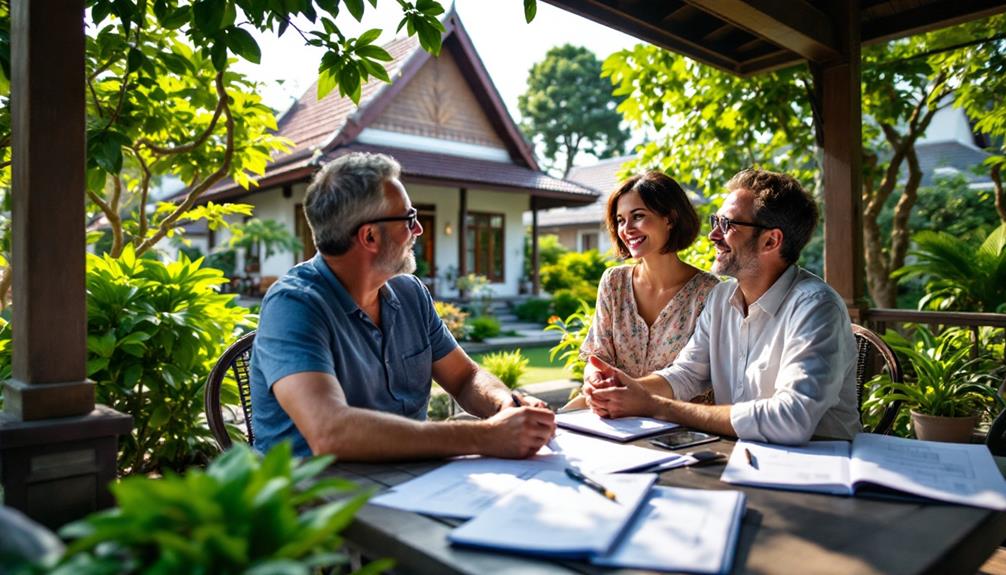
Maneuvering the complexities of buying property in Thailand as a US citizen can be considerably eased by working with knowledgeable real estate agents. These agents are your lifeline in the bustling Thai real estate market, where trends can shift quicker than a tuk-tuk in rush hour.
Their responsibilities include providing local expertise and ensuring you don't accidentally purchase a charming bungalow that doubles as a snake sanctuary. Your agent should excel in negotiation strategies, driving a hard bargain on your behalf without breaking a sweat—or a calculator.
Accurate property valuation is essential, so you're not overpaying for a place that's only slightly larger than a closet. With client representation, they'll be your advocate, ensuring your best interests are front and center.
Legal advice is another area where agents shine. Steering through Thai property laws without guidance is like trying to read a map upside down in the dark—confusing and potentially disastrous.
A good agent will illuminate the path with the latest market trends and legal know-how. So, trust these professionals to guide you through the process, and avoid learning the hard way why you shouldn't DIY your Thai property purchase.
Navigating the Buying Process
Maneuvering through the buying process in Thailand requires an informed approach, as it's not just about exchanging currency for keys.
This isn't a quirky Hollywood rom-com where you trip over a dream home and fall into ownership. Instead, think of it as a strategic dance with a flair for property investment.
Understanding the steps is essential, so here are some key notes to keep you in rhythm:
- Legal Restrictions: As a US citizen, you can't buy land, but you can own a condo as long as 51% of the building is Thai-owned.
- Due Diligence: Research the property thoroughly. This isn't a time for impulse decisions—think of it as a home buying detective game.
- Financing Options: Mortgages can be tricky. Thai banks generally prefer lending to locals, so you'll need to explore alternative financing.
- Engage a Lawyer: Having a local lawyer is invaluable. They navigate the legal labyrinth so you don't end up starring in your own legal thriller.


